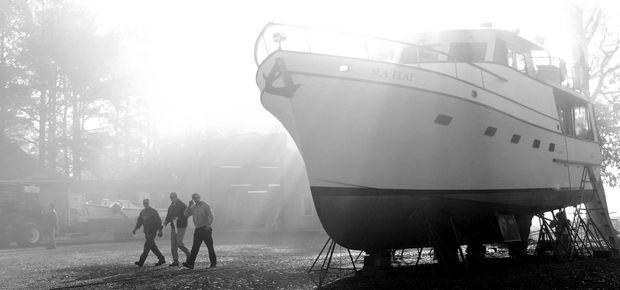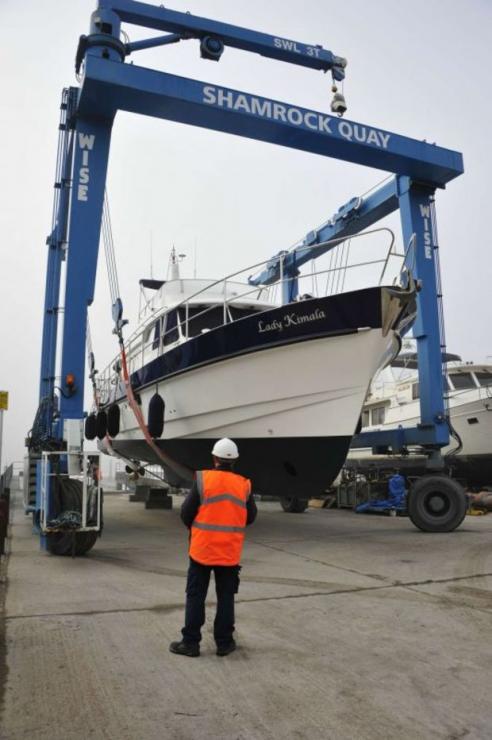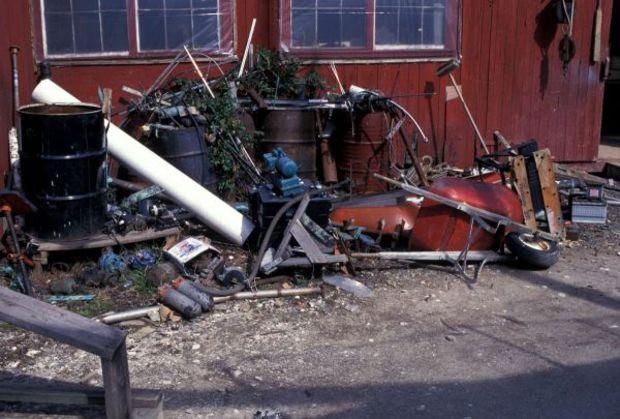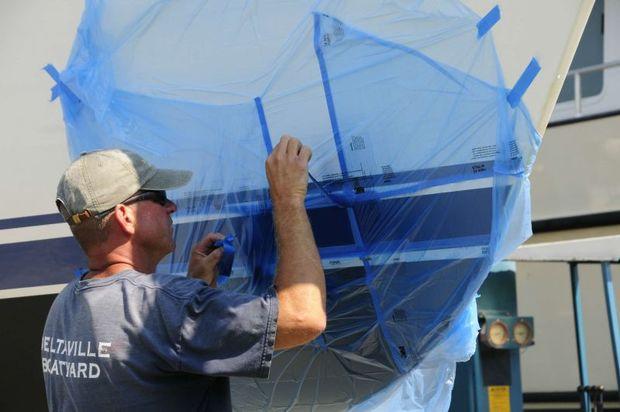Select the Best and Forget the Rest

Working with boat yards and marine industry contractors (simply boat yards from here onward) can be a love-hate relationship; and based on what I see on a near daily basis, and from what my clients tell me, it’s more of the latter than the former. As a result of over a decade of experience as a boat yard manager, I’m firmly convinced it need not be this way. As a boat owner, you have the power to insist that boat yards do the right thing, and you have the option of going elsewhere if they can’t or won’t live up to your expectations.
You control the purse strings and thus
you are in charge.
The key to success lies in evaluating those you are considering allowing aboard your vessel
before making a commitment. Follow these guidelines and you’ll be able to do so with a minimum of stress and hassle.

Appearances matter; follow your instincts
Provided you have the right “tools,” you can begin evaluating a boat yard from the very first moment of contact. For example, is the facility neat, clean, and squared away; are the buildings well-maintained or are there piles of trash and disused equipment lying around; are windows broken; and is the paint peeling, both literally and figuratively? Is the staff attentive; do they look you in the eye and greet you as you walk by; is their appearance professional? Is the equipment (the TravelLift, fork lift, vehicles) well maintained, or are they streaked with rust and threadbare?
Does the facility seem over-staffed? One of my greatest pet peeves, and I have many where boat yards are concerned, is the sight of two or more people carrying out a task that requires but one individual. This practice speaks volumes about the management structure, attention to cost effectiveness, and efficiency of the organization as a whole.
Written correspondence is a must; all questions, requests, quotes and responses should be made or followed up in writing.
Membership in professional organizations such as ABYC (American Boat and Yacht Council), and NMEA (National Marine Electronics Association) are veritable prerequisites.
Certifications that require those who hold them to pass
rigorous written exams, such as those offered by ABYC and NMMA (National Marine Manufacturers Association), are good indicators, but not the last word, of proficiency.
I’m routinely asked “can you recommend a yard/contractor for this work?” or, “how do I know if a yard is any good?” The answers to these and other boat yard proficiency related questions aren’t easily obtained. There are, however, standards by which boat yards and the folks completing marine repair, refit, and service work can be judged. ABYC provides a clear framework for many, but not all, of the tasks that are carried out in boat building and repair, these are clearly defined in their voluminous “Standards and Technical Information Reports for Small Craft,” a telephone book-like tome that includes everything from guidance on AC and DC electrical systems to propeller shaft installations.

Additionally, ABYC offers certifications in a variety of disciplines, including composites/fiberglass, diesel and gasoline engines and support systems, marine corrosion, refrigeration and A/C, and marine systems and standards accreditation. Rest assured, this is no rubber-stamp program, and certifications are only given to those who successfully pass rigorous 200-question exams (I’m a certified Master Technician, and helped write the ‘Systems’ Exam). Those who obtain three or more certifications become Master Technicians.
The value of the certification is clear. You can be reasonably certain that the folks who are certified at least know the basics of a particular discipline and likely much more. When I work with an ABYC-certified electrician, I’m not wondering if, for instance, he or she knows how to calculate the ampere-carrying capacity of a particular gauge of wire, or where in a circuit fuses or circuit breakers should be installed. I also know that when I work with an ABYC-certified composite technician, there’s no question about his or her ability to properly catalyze resin or apply tabbing.
Yet another standard you can and should expect a yard to uphold is the most self-evident, and yet it’s the most often violated: a clear agreement to follow
all equipment manufacturer-supplied instructions. In the vessel inspections I carry out I routinely cite this violation above all others. Today, even for older gear where the printed manual may not be available, virtually every installation and operation manual is available online, making failures to follow these instructions inexcusable. This is important. Insist upon it.
Do your homework
When you are evaluating potential yards or the next time you sit down with your existing boat yard manager or marine contractor to discuss a repair, maintenance, refit or installation, be prepared with a few questions.
- Do they quote work? If so, what are the terms of the quote, and what’s the yard’s definition of a quote? Is the price fixed or is it an estimate, and does it include shipping, taxes, and other fees?
- For T&M and quoted projects, what’s the material markup protocol?
- Is the yard’s workmanship guaranteed, and if so what happens if I’m far away from the yard and someone else has to undertake repairs?
- How are third-party warranties handled—will the yard act as an intermediary for gear they install that then fails? For instance, if an inverter the yard installs fails, will they assist you in getting coverage?
- Will the work be carried out to ABYC/NMEA (or another) standard? If so, are the folks doing the work ABYC/NMEA certified in the appropriate discipline or supervised by those who are? Does the yard have a valid membership in this organization?
- Make certain it’s agreed that all work is to comply with manufacturer’s installation instructions.
- If the work is quoted, is it billed in segments as the work is carried out?
- Do you need to provide a deposit for work before it begins, and if so, what’s the typical percentage or amount?
- Will I be charged for storage, dockage, or electricity while work is being carried out? (Ideally you shouldn’t be, at least not for short term stays.)
- Timely invoicing is important, particularly for T&M work. Being slammed with a huge invoice after the work is completed or nearly completed should be avoided. Toward that end, ask how often are invoices sent out. If you call or email, can you get an up-to-the-minute (or at least through the previous work day) progress report on the amount of work that’s been completed or invoiced?
- Establish a time table for the work’s completion. Never, ever say “There’s no rush; work on it when you have time,” as this is a near-certain recipe for disaster.
- Ask to see a sample invoice. Having wrestled with the equation of providing enough information, but not too much, I’m sensitive to how detailed invoices are, or are not. I once had a client describe the invoicing from a yard, in which he had nearly $100,000 worth of work completed, as “less than useless” because it was so confusing and riddled with errors. Ideally, it would be beneficial to see an example of what you can expect to receive before committing to any project, especially a costly and/or lengthy one.

Remember, you are the customer. You have the power to either get what you want, or go elsewhere. The questions you ask and the answers you receive to them will be telling. Those that are savvy and willing to work to earn your business will take them to heart and respond positively. Those that fail to do so don’t deserve your business.
About the Author: Former boatyard manager, technical writer, and lecturer, Steve D'Antonio, consults for boat owners and buyers, boat builders, and others in the industry. Visit
stevedmarine.com for his weekly technical columns.
 Working with boat yards and marine industry contractors (simply boat yards from here onward) can be a love-hate relationship; and based on what I see on a near daily basis, and from what my clients tell me, it’s more of the latter than the former. As a result of over a decade of experience as a boat yard manager, I’m firmly convinced it need not be this way. As a boat owner, you have the power to insist that boat yards do the right thing, and you have the option of going elsewhere if they can’t or won’t live up to your expectations. You control the purse strings and thus you are in charge.
The key to success lies in evaluating those you are considering allowing aboard your vessel before making a commitment. Follow these guidelines and you’ll be able to do so with a minimum of stress and hassle.
Working with boat yards and marine industry contractors (simply boat yards from here onward) can be a love-hate relationship; and based on what I see on a near daily basis, and from what my clients tell me, it’s more of the latter than the former. As a result of over a decade of experience as a boat yard manager, I’m firmly convinced it need not be this way. As a boat owner, you have the power to insist that boat yards do the right thing, and you have the option of going elsewhere if they can’t or won’t live up to your expectations. You control the purse strings and thus you are in charge.
The key to success lies in evaluating those you are considering allowing aboard your vessel before making a commitment. Follow these guidelines and you’ll be able to do so with a minimum of stress and hassle.

 Additionally, ABYC offers certifications in a variety of disciplines, including composites/fiberglass, diesel and gasoline engines and support systems, marine corrosion, refrigeration and A/C, and marine systems and standards accreditation. Rest assured, this is no rubber-stamp program, and certifications are only given to those who successfully pass rigorous 200-question exams (I’m a certified Master Technician, and helped write the ‘Systems’ Exam). Those who obtain three or more certifications become Master Technicians.
The value of the certification is clear. You can be reasonably certain that the folks who are certified at least know the basics of a particular discipline and likely much more. When I work with an ABYC-certified electrician, I’m not wondering if, for instance, he or she knows how to calculate the ampere-carrying capacity of a particular gauge of wire, or where in a circuit fuses or circuit breakers should be installed. I also know that when I work with an ABYC-certified composite technician, there’s no question about his or her ability to properly catalyze resin or apply tabbing.
Yet another standard you can and should expect a yard to uphold is the most self-evident, and yet it’s the most often violated: a clear agreement to follow all equipment manufacturer-supplied instructions. In the vessel inspections I carry out I routinely cite this violation above all others. Today, even for older gear where the printed manual may not be available, virtually every installation and operation manual is available online, making failures to follow these instructions inexcusable. This is important. Insist upon it.
Additionally, ABYC offers certifications in a variety of disciplines, including composites/fiberglass, diesel and gasoline engines and support systems, marine corrosion, refrigeration and A/C, and marine systems and standards accreditation. Rest assured, this is no rubber-stamp program, and certifications are only given to those who successfully pass rigorous 200-question exams (I’m a certified Master Technician, and helped write the ‘Systems’ Exam). Those who obtain three or more certifications become Master Technicians.
The value of the certification is clear. You can be reasonably certain that the folks who are certified at least know the basics of a particular discipline and likely much more. When I work with an ABYC-certified electrician, I’m not wondering if, for instance, he or she knows how to calculate the ampere-carrying capacity of a particular gauge of wire, or where in a circuit fuses or circuit breakers should be installed. I also know that when I work with an ABYC-certified composite technician, there’s no question about his or her ability to properly catalyze resin or apply tabbing.
Yet another standard you can and should expect a yard to uphold is the most self-evident, and yet it’s the most often violated: a clear agreement to follow all equipment manufacturer-supplied instructions. In the vessel inspections I carry out I routinely cite this violation above all others. Today, even for older gear where the printed manual may not be available, virtually every installation and operation manual is available online, making failures to follow these instructions inexcusable. This is important. Insist upon it.
 Remember, you are the customer. You have the power to either get what you want, or go elsewhere. The questions you ask and the answers you receive to them will be telling. Those that are savvy and willing to work to earn your business will take them to heart and respond positively. Those that fail to do so don’t deserve your business.
About the Author: Former boatyard manager, technical writer, and lecturer, Steve D'Antonio, consults for boat owners and buyers, boat builders, and others in the industry. Visit stevedmarine.com for his weekly technical columns.
Remember, you are the customer. You have the power to either get what you want, or go elsewhere. The questions you ask and the answers you receive to them will be telling. Those that are savvy and willing to work to earn your business will take them to heart and respond positively. Those that fail to do so don’t deserve your business.
About the Author: Former boatyard manager, technical writer, and lecturer, Steve D'Antonio, consults for boat owners and buyers, boat builders, and others in the industry. Visit stevedmarine.com for his weekly technical columns.